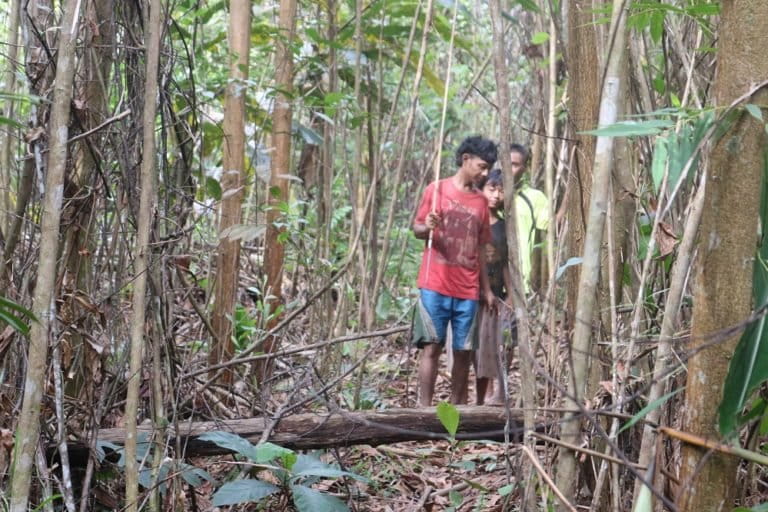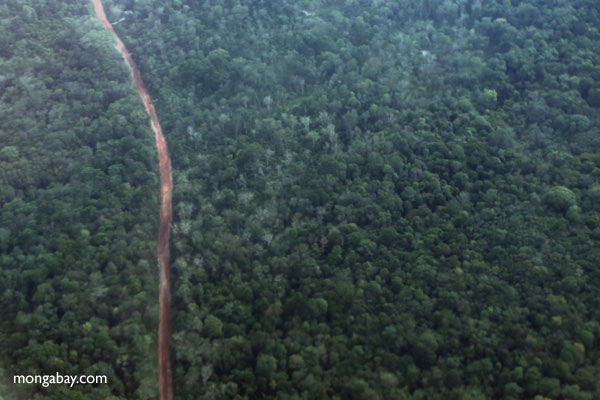- The Indonesian government has granted permission to a coal company to build a road that would cut through the highly biodiverse Harapan forest in Sumatra.
- The road is for transporting coal from the company’s mine to power plants in South Sumatra province.
- Experts have called on the company to have the road skirt the forest and use an existing road network, but the company has not issued any revision of its design.
- Conservationists and indigenous communities have warned that the road could devastate the ecosystem, create more habitat fragmentation and facilitate further encroachment for logging, hunting and agriculture.
BATANGHARI, Indonesia — On a sunny day in March, six teenagers have their hands full planting seedlings in a patch of burned forest in Sumatra.
“This was our first time planting trees right in a forest,” said Rifai, 14. The planting site is part of a 10-hectare (25-acre) swath of the Harapan forest that was razed by illegal loggers last September.
Rifai added, “I’m very excited to be able to do something for nature.”
He and his peers didn’t know it yet, on that bright morning four months ago, but their efforts had already been rendered effectively useless by then, thanks to the environment ministry’s approval for a road to be built — and forest cleared — to serve nearby coal mines.
The ministry signed off on the project, proposed by coal miner PT Marga Bara Jaya (MBJ), in October last year, but it wasn’t until June this year, following an investigation by Mongabay’s Indonesia team, that the approval came to light. Neither MBJ nor the environment ministry responded to Mongabay’s requests for confirmation before this story was published.

The approval gives MBJ control of 424 hectares (1,048 acres) of the Harapan forest. The company plans to build an 88-kilometer (55-mile), a third of it through the forest, to truck coal from its mine in Musi Rawas district to power plants in Musi Banyuasin district, both in South Sumatra province.
The Harapan forest, whose name in Indonesian means “hope,” spans 76,900 hectares (190,000 acres) in the provinces of South Sumatra and Jambi. It represents 20% of Sumatra’s remaining lowland tropical rainforest, and is home to some 1,350 species, including 133 globally threatened species such as the Sumatran tiger and elephant (Panthera tigris sondaica and Elephas maximus sumatranus). It’s also home to Indigenous groups such as the Batik Sembilan community.
For decades, the expansion of oil palm plantations and incursion of illegal loggers ate away at the forest. But today the road project is the single biggest threat to this patch of biodiverse forest in central Sumatra.
Conservationists and indigenous communities have warned that cutting a road through the forest could devastate the ecosystem, further fragmenting the habitat and allowing greater access for loggers, poachers and farmers.
Previously a logging zone, the Harapan forest was designated in 2008 as Indonesia’s first ecosystem restoration concession (ERC). These are former concessions that private companies can license for restoration as part of their CSR obligations. The target is to restore these degraded areas to their previous forested state, thus preventing them from being permanently turned into palm plantations or smallholder farmland.
The forest restoration effort in Harapan is managed by PT Restorasi Ekosistem Indonesia (REKI). The company has been opposed to the coal road project since it was proposed in the early 2010s. It estimates the project would affect nearly 6,000 hectares (14,800 acres) of the forest, much of it would be in the form of land clearing. Another potential impact would be an increase in human-wildlife conflict, said Mangarah Silalahi, chief executive of REKI.
“The number of conflicts involving elephants that happen around the Harapan forest reported to us is about 10 cases every year, spread in different locations,” he said, adding that this figure was likely a fraction of the true number of cases, most of which go unreported.

Conservationists say the coal road doesn’t have to go through the forest. The South Sumatran provincial government’s assessment committee last year ordered the company to have the road skirt the forest, using an existing road network. MBJ agreed to revise its design, but has not yet published a new proposed route or indicated whether it will indeed consider upgrading existing roads around the forest.
“They wouldn’t have to cut trees anymore,” said Diki Kurniawan, a director at the Jambi chapter of the Environmental Legal Aid Foundation (YLBHL). The nonprofit is one of 36 local and international civil society organizations that have criticized MBJ’s environmental impact assessment for the coal road development through the Harapan forest.
The coalition, called Anti Forest Destruction, estimates the deforestation as a result of the project will result in 8.84 trillion rupiah ($615 million) worth of lost ecosystem services.
But MBJ’s plans have received the official backing of the governors of both South Sumatra and Jambi. These recommendations appear to have been key to the project being quietly approved by the environment ministry last year.
Mukshin, a member of the Batin Sembilan community, said he couldn’t imagine the disaster that would result from the road being built through Harapan. He said the outcome would be devastating for the Indigenous community whose livelihood centers on the forest.
“If it’s all cleared and encroached, where else will the elephants and tigers have to go but into our community?” he said.

This story was first reported by Mongabay’s Indonesia team and published here on our Indonesian site on July 6, 2020.
Header image: Sumatran elephants. Photo by Rhett A. Butler.
FEEDBACK: Use this form to send a message to the author of this post. If you want to post a public comment, you can do that at the bottom of the page.







